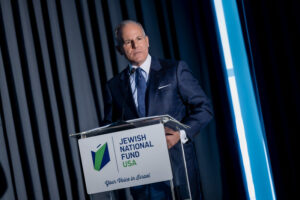
By Jacob Kamaras
SAN DIEGO — Rising antisemitism is a natural concern in the Jewish community for a variety of reasons, many of which Elan S. Carr outlined on Monday at Jewish National Fund-USA’s Legacy Luncheon. Yet Carr, who has worked on countering Jew-hatred worldwide from the upper echelon of government, somehow remains an optimist on this often-grim subject.
“I didn’t come here to rain on your parade, but if I weren’t an optimist, I wouldn’t have taken the appointment that I did…I know that we can roll this back, we can win this fight…but only if we do the right thing,” Carr, the U.S. special envoy for combating antisemitism from 2019-2021, told the crowd at the Hilton San Diego Bayfront.
Carr articulated a multi-pronged strategy for confronting antisemitism that centers on three initiatives he worked on during his years in the Trump administration.
First, “you can’t beat an enemy if you don’t know an enemy,” said the U.S. Army Reserve officer, referring to the need to promote the International Holocaust Remembrance Alliance (IHRA) definition of antisemitism.
Carr explained that the IHRA definition — which is increasingly being adopted by local, state, and federal governments as well as other entities around the world — covers 11 examples of how Jew-hatred is manifested, from its classic to modern forms. That means the definition addresses the “new antisemitism,” which attempts to hide behind hatred of the State of Israel and the denial of Jewish self-determination.
While antisemitism is considered protected speech in the U.S., “that doesn’t mean that you can’t call it out, that doesn’t mean that you can’t condemn it, that doesn’t mean you can’t educate about how despicable and vile it is,” said Carr. Notably, the Obama, Trump, and Biden administrations have all “doubled down” on the IHRA definition, a rare bipartisan feat, he said.
Second, Carr, a former deputy district attorney in the Los Angeles County District Attorney’s office, expressed the need for anti-radicalization education and training for individuals who have been accused of crimes. In every single case where a crime shows any tinge of a religious or ethnic motive, or even when such bias is not apparent, Carr said he “never finished a case like that without forcing the defendant to undergo a tolerance program. Every single one.” He called for state governments and the U.S. Department of Justice to fund online programs that provide tolerance education.
Third, Carr noted the effectiveness of anti-BDS legislation, which is now enacted in a majority of U.S. states. Unilever stock, he pointed out, plummeted after the company’s decision in 2021 to end sales in Israeli settlements. Eventually, Unilever, which Carr said “was brought to its knees,” ended its boycott of the settlements.
Prior to conveying these suggested responses to antisemitism, Carr reviewed the current state of the problem, which he described as an “ancient, indefatigable sickness.” Less than eight decades after the Holocaust, he asked, “Who could imagine…that we would see antisemitism rising across the world, even in Europe, and yes even here in the United States, one of the most philosemitic countries in history?”
Antisemitism is driven by disparate ideological sources that find common ground, he said — from white supremacists on the far right, to militant Islam, to the radical left on college campuses.
Today, we are seeing fatal synagogue shootings and “torch-lit marches, the likes of which we thought we had long since graduated from,” Carr said.
After speaking at a synagogue in Paris, Carr was advised to take off his yarmulke on the street. “That tells you everything you need to know,” he said, though he received applause when he added, “By the way, I kept my kippah on.”
When he met with Christian pastors while serving in the Trump administration, Carr said he would consistently hear from the clergy members that they raise their children to be pro-Israel as a matter of faith, but then they “come back turned” when they go to college.
JNF-USA, meanwhile, combats antisemitism by promoting Zionism — particularly among the younger generation, explained Cynthia Hizami, the organization’s planned giving director for the West Coast. This includes the teen travel initiative Dream Israel, alternative spring break trips, the Shorashim trip through Birthright Israel, the Caravan for Democracy trip for non-Jewish student leaders, and a faculty fellowship trip for college and university professors.
Sen. Fabian Doñate, now a member of the Nevada state legislature, participated in Caravan for Democracy and called it a “life-changing experience” that has shaped his current support for Israel, Hizami said. The faculty members who have visited Israel with JNF-USA, she added, “are showing us what true collaboration between the United States and Israel really means” by continuing their relationships with professional peers in the Jewish state.
Finally, Hizami said that JNF-USA’s Alexander Muss High School in Israel — the only pluralist, college prep, fully accredited program where high school students from the U.S. and across the globe study abroad together — enables students to “make Israel their living classroom by visiting the sites that they study” and helps them have “a voice, instead of remaining silent” on the discourse surrounding Israel once they reach college and the workforce.
*
Jacob Kamaras is editor and publisher of San Diego Jewish World.